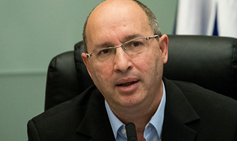

Publications Regarding The Judicial Selection Committee
Articles

A Review of the Moves Designed to Weaken Israeli Democracy: Working Document
Written By: Adv. Anat Thon Ashkenazy, Adv. Daphne Benvenisty
Knesset Summer Session: April 2025 to July 24, 2025

Arab Representation in the Judiciary is Under Threat
Written By: Adv. Lital Piller
By shifting power from professional bodies to political appointees the new law restructuring the Judicial Selection Committee is likely to reduce Arab representation and exacerbate their exclusion.

The Government Against the Rule of Law
Written By: Dr. Guy Lurie
The Israeli government's current efforts to dismiss the head of the director of the Shin Bet and the Attorney General, alongside its attempt to restructure the Judicial Selection Committee, reflect a broader shift toward subordinating legal and security institutions to political authority, raising concerns about the erosion of the rule of law and the future of democratic governance in Israel.

Exploiting the Public's Distraction to Pursue the Judicial Overhaul
Written By: Dr. Guy Lurie
Amidst the return to fighting in Gaza, the Minister of Justice is taking advantage of the public's eye being off the ball to hastily overhaul Israel's judicial system.

Israel’s Renewed Judicial Overhaul
Written By: Prof. Yuval Shany, Prof. Amichai Cohen
The battle over Israel’s legal system has resumed, threatening judicial independence.

The Dangerous Politicization of Judicial Appointments
Written By: Dr. Amir Fuchs
Changes in the composition of the Judicial Selection Committee threaten the independence of the judicial system. The current proposals would lead to a complete politicization of appointments to all courts and should be blocked.

What Happens When Israel’s Minister of Justice Refuses to Cooperate with the Chief Justice?
Written By: Dr. Guy Lurie
IDI's Dr. Guy Lurie explains the far-reaching implications of non-cooperation between the two leaders of Israel's judiciary.
"It's the everyday citizens who are sure to pay the price."

The Danger of a Politicized Judicial Selection Committee
Written By: Dr. Guy Lurie
Dr. Guy Lurie, a Research Fellow at IDI's Democratic Values and Institutions Program, offers a breakdown on the risks of politicization inherent in the recent proposal by Minister of Justice Levin and Foreign Minister Sa'ar to reform the Judicial Selection Committee.

A Large Majority of Israelis Support Proceeding to the Second Stage of the Ceasefire Agreement
Written By: Prof. Tamar Hermann, Dr. Lior Yohanani, Yaron Kaplan, Inna Orly Sapozhnikova
More Israelis (43%) think Hamas' interests have been served better in the first stage of the ceasefire agreement than Israel's (21%); however, a majority still supports proceeding to the next stage (70%) if the first stage is completed as agreed; a vast majority of Israelis (72.5%) think the ceasefire agreement was achieved thanks to President Trump's intervention.

A Chief Justice Under Attack
Written By: Prof. Suzie Navot
While the selection of Justice Amit as President of the Supreme Court was done in accordance with the relevant legislation, the Justice Minister has declared the procedure "fundamentally improper and illegal." His refusal to recognize the selection creates a precedent that may lead to the deterioration of the authority of other institutions. This is what the beginning of a constitutional crisis looks like.

What is the Significance of the Justice Minister’s Declaration that he Will Not Cooperate with the President of the Supreme Court?
Written By: Dr. Guy Lurie
The lack of cooperation between the Minister of Justice and the President of the Supreme Court has numerous consequences that will, among other things, harm the services provided by the judiciary to the citizens of Israel.

A Legitimate Supreme Court President
Written By: Dr. Guy Lurie
Following Justice Isaac Amit's selection as Supreme Court President, Minister of Justice Levin immediately declared he would refrain from any collaboration between them, describing the selection process as unlawful. This announcement is both factually incorrect and a serious dereliction of his duties.

Ministers Levin and Saar's Proposed Changes to the Judicial Selection Committee
Written By: Dr. Guy Lurie
Justice Minister Yariv Levin and Foreign Minister Gideon Sa’ar presented their proposed changes to the composition of the Judicial Selection Committee (JSC) as a compromise aimed at achieving a gradual change in the judicial selection process, but many constitutional experts worry that the plan will have dire consequences resulting in the politicization of Israel’s judicial selection process.

The Politicization Revolution in Judicial Selection
Written By: Dr. Guy Lurie
The Sa'ar-Levin proposal represents a shift from prioritizing professional qualifications in the Judicial Selection Committee to emphasizing political loyalty as the basis for judicial appointments. This risks eroding judicial independence, compromising professionalism, and incentivizing ideological extremism.

“Democracy on the Frontlines” Conference Survey
Written By: The Israel Democracy Institute
Only a small minority of the Israeli public (8%) think that the judicial overhaul should be the government’s highest priority today; The majority of respondents (53%) support keeping the current structure of the Judicial Selection Committee. Only around a quarter (27%) suppor adding politicians to the Committee.

IDI Experts on the New Levin-Saar Proposal to Change the Judicial Selection Committee
Written By: Israel Democracy Institute
In a statement following publication of the new initiative released by Minister of Justice Yariv Levin and Foreign Minister Gideon Saar, IDI experts weigh in on the new proposal to change the Judicial Selection Committee.

“If I am not the one deciding – then we will change the rules”
Written By: Prof. Suzie Navot
In September, the Supreme Court ordered the Minister to fulfill his duty to convene the Committee because the system cannot be paralyzed. Since then, the Minister has convened the committee, but refused to appoint the Supreme Court President. Now, the Court has ordered him to do so.

Constitutional Crisis – Definitions, Precedents, Implications
Written By: Dr. Amir Fuchs, Adv. Daphne Benvenisty, Dr. Nadav Dagan
Recently, Israel has faced a number of situations that could lead to a constitutional crisis. What is a constitutional crisis and why is it dangerous for the stability of democracy? IDI experts explain.

Explainer: Appointment of the President of the Supreme Court
Written By: Dr. Guy Lurie
How is the Chief Justice in Israel selected, what is the principle of seniority and how does this compare internationally? Dr. Guy Lurie explains the roles and responsibilities of the Chief Justice, an issue that is currently at the heart of a dispute between the Minister of Justice and the Courts.

Understanding the Supreme Court's Ruling: Selection of the Supreme Court President
Written By: Dr. Guy Lurie
The Israeli Supreme Court recently issued a pivotal ruling, instructing the Minister of Justice to convene the Judicial Selection Committee and select a new President of the Supreme Court. This decision come after nearly a year in which this permanent position has remained vacant.

Appointing a President for the Supreme Court: Justice Levin's Actions Contravene the Law
Written By: Prof. Suzie Navot
After the Minister of Justice Yariv Levin refrained from convening the Judicial Selection Committee to appoint a Supreme Court President, the Supreme Court ruled that the Committee must convene to appoint a President—Prof. Suzie Navot analyzes the Court's decision.

Judicial Selection in Israel in the Aftermath of the Judicial Overhaul
Written By: Dr. Guy Lurie
With the outbreak of the war in October 2024, the Prime Minister announced that he was halting all legislation relating to the judicial overhaul, however, various government actions raise questions regarding its intentions in relation to the overhaul and whether it might be trying to advance it by other means beyond legislation.

The United Nations’ Warning about Undermining the Independence of the Judiciary
Written By: Dr. Guy Lurie
The UN report paints a disturbing picture in which countries experience “autocratization”—an erosion of the foundations of democracy—through actions that undermine the judicial system’s independence. In Israel, the current government is aiming to undermine judicial independence in order to consolidate its power and authority at the expense of individual rights and the rule of law.

“Unity” as a Means to Weaken the Judicial System
Written By: Dr. Guy Lurie
While the Israeli public has been focusing on the war and on the hostages in Gaza, the government—led by the minister of justice—has been preparing an assault on the independence of the judicial system.

The Judicial Overhaul and Anti-Democratic Initiatives
Written By: Adv. Anat Thon Ashkenazy, Adv. Daphne Benvenisty
Judicial overhaul initiatives, along with other anti-democratic measures, have continued to be promoted by the government and the coalition in the Knesset. This document outlines the various actions taken in government that weaken the Israeli judiciary and democracy at large.

The Invisible Safeguards of Judicial Independence in the Israeli Judiciary
Written By: Dr. Guy Lurie
The Israeli democracy regulates the operation of the judiciary through the constraints of formal rules that check the political actors, the individual judges, and the judiciary. Yet beyond these formal rules, informal institutions and practices are sometimes equally important in the operation of the judiciary, as they are in any constitutional system. This article discusses informal institutions that are important in the operation and independence of the Israeli judiciary.

The Justice Minister’s Decision to Convene the Judicial Selection Committee
Written By: Dr. Guy Lurie
On November 5, 2023, Minister of Justice Yariv Levin notified the High Court of Justice that he will convene the Judicial Selection Committee within 15 days. Selecting judges is not possible in such a short time frame, so we will have to wait and see whether this decision leads to the completion of judge appointments to the vacant positions.

Israel needs a strong supreme court now more than ever
Written By: Dr. Guy Lurie
Justice Hayut's retirement from the presidency of the Supreme Court was well-known in advance, however, the Minister of Justice's refusal to convene the Judicial Selection Committee leaves Israel with a temporary replacement during a national emergency.

Three Big Cases in Israel's September to Remember
Written By: Prof. Amichai Cohen, Prof. Yuval Shany
Three petitions before the Israeli Supreme Court are transforming the usually slow month of September into a pivotal one in Israel’s ongoing judicial crisis.

The Judicial Selection Committee must be convened now
Written By: Dr. Guy Lurie
The Judicial Selection Committee has not met for more than a year, and during this period, various positions held by judges have been vacated.

Justice Yosef Elron challenges the superiority method
Written By: Dr. Guy Lurie
IDI expert Dr. Guy Lurie met with KAN's Mark Weiss to discuss Supreme Court Justice Yosef Elron's announcement that he would seek election as the next Supreme Court president, a decision that flies in the face of the "seniority method" that has been used to select the court's president to date.

Not Unreasonable - Irresponsible
Written By: Dr. Guy Lurie
The law is clear. The Minister is obligated to convene the committee when judicial vacancies appear. By evading this responsibility, he is failing in his duty.

The Courts Use Reasonability in Moderation
Written By: Dr. Guy Lurie
Dr. Guy Lurie, IDI expert discusses the court's use of the Standard of (Extreme) Unreasonableness and current status of the judicial overhaul.

The Complexities of the Judicial Overhaul in Israel
Written By: Dr. Jesse Ferris
Dr. Jesse Ferris with New York Times' Bret Stephens and Prof. Avi Bell discuss the complexities of the judicial overhaul and its significance on the future of Israel on Sapir Conversations podcast.

Overhauling the Supreme Court
Written By: Dr. Guy Lurie
Dr. Guy Lurie in an in-depth interview with The Jewish Time podcast's Jeff Silberblatt on the attempted judicial overhaul and its implications on Israel's future.

Appointment of Judges to High Courts in Democratic Countries: A Comparative Study
Written By: Prof. Amichai Cohen, Dr. Guy Lurie
The research examined 42 countries included all the OECD member states along with other leading democratic countries.

Statement by the Israel Democracy Institute on President Herzog’s Proposal
The Israel Democracy Institute congratulates President Isaac Herzog on his extraordinary efforts. While the President’s plan contains some problematic elements, if it were to be adopted in its entirety as a package, we would support it because it safeguards our democracy and bolsters key elements of our constitutional foundations.

Only a Minority of Israelis Support the Proposed Judicial Overhaul
Written By: Prof. Tamar Hermann, Dr. Or Anabi
66% of Israelis: Supreme Court should have power to strike down laws that are incompatible with Israel’s Basic Laws | On Judicial Selection Committee: 63% Support Current Principle Requiring Agreement between Politicians and Justices.

We Already Know the Future of Israel’s Courts. It’s Not Good.
Written By: Dr. Guy Lurie
Rabbinical courts, where appointments are based on political loyalty, offer a cautionary model of a judicial nightmare

The Fight Over Judicial Appointments in Israel
Written By: Prof. Amichai Cohen, Prof. Yuval Shany
Since 1953, judicial appointments in Israel have been made through a Judicial Selection Committee in which legal professionals—judges and lawyers—are in the majority and politicians in the minority. The new Israeli government’s plans for legal reform turn this system on its head and allow the coalition to fully control appointments to all parts of the judiciary, thus consolidating its dominant position in all three branches of government.

Changing the System for Judicial Appointments—Only with a Broad Consensus
Written By: Dr. Guy Lurie
Despite controversy, changes to the Judicial Selection Committee, must be made with broad consensus - and not by slimmest of majorities.

How Israeli Judges Are Appointed: Questions and Answers
Written By: Dr. Guy Lurie
Why it is a bad idea to allow the coalition the deciding voice in the appointment of Supreme Court justices? Is it true that in Israel, judges appoint themselves? The complete guide to the impending constitutional reform.

Recommendations for the Incoming Justice Minister
Written By: Dr. Nadiv Mordechay
After three contentious election campaigns Israel's new government has been sworn in. IDI's experts weigh-in with their recommendations on the most important issues on the agenda.

IDI Scholars Respond to Bill to Cancel Supreme Court Seniority System
The Israel Democracy Institute responded Thursday to the proposed bill to cancel the seniority system and deferral of deliberations on choosing Esther Hayut as the president of the Supreme Court, saying such steps harm the basic principles of the work of the judicial branch.

The Levin-Sa’ar Plan: Don’t Slam the Door on Someone Looking for a Way Out of Their Own Mess
Written By: Prof. Benjamin Porat
The Levin-Saar plan abandons key elements of his earlier judicial overhaul, proposing changes to judicial selection and Basic Laws. While flawed, it offers a potential starting point for bipartisan negotiations to resolve Israel’s constitutional crisis.



